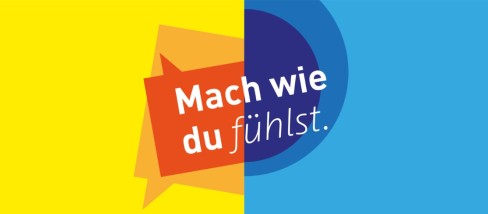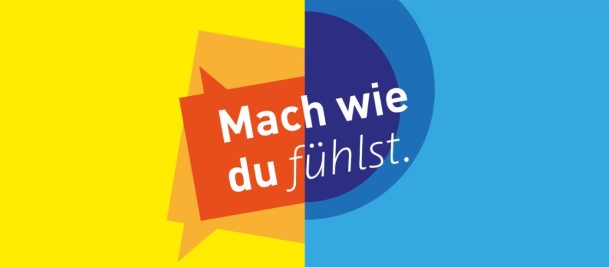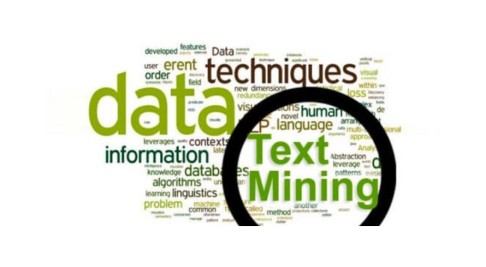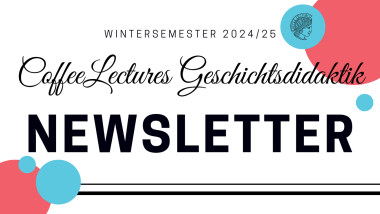-
![]() Bild: M. Grabarits
Bild: M. Grabarits![]() Bild: M. Grabarits
Bild: M. Grabarits12. Newsletter der Coffee Lectures Geschichtsdidaktik
2025/06/30
Im zwölften Newsletter berichten wir von der zurückliegenden Coffee Lecture, einem Besuch im Studienseminar Darmstadt und einer Weiterbildung zum Thema „Antisemitismus in der Schule“. Außerdem die Einladung zur Tagung „Das lernende Gehirn“ sowie ein Hinweis auf das neue Heft von Geschichte lernen – Die 1980er Jahre. Als Tool der visuellen Art lernen Sie Napkin.ai kennen und vertiefen mit „Geschichtsstundenplanung“ (2023) ihre Unterrichtsvorbereitung.
-
![]() Picture: HDSM
Picture: HDSM![]() Picture: HDSM
Picture: HDSMHDSM Newsletter. Issue 4 (May 2025)
2025/06/06
HDSM Team is excited to announce the release of our May newsletter issue.
This newsletter provides updates about the current projects of HDSM, new publications as well as upcoming events. If you are interested in the more updates, please subscribe to our newsletter!
-
![]()
![]()
Das Institut für Geschichte auf der Hobit Contact 2025
2025/05/15
Am Dienstaag, 20.05.2025 von 09:00 Uhr bis 13:00 Uhr
Auch in diesem Jahr präsentiert sich das Institut für Geschichte der TU Darmstadt bei der Hobit Contact
-
![]() Picture: Büro für Nachhaltigkeit, TU Da
Picture: Büro für Nachhaltigkeit, TU Da![]() Picture: Büro für Nachhaltigkeit, TU Da
Picture: Büro für Nachhaltigkeit, TU DaSecretarial workshop on sustainability at TU Darmstadt
2025/04/24
The workshop provided participants with a platform for further networking. It is important that as many TU members as possible commit to meeting the climate targets and work together to reduce the university's ecological footprint.
Our colleague Anita Schilz (Department of Medieval Studies) took part in the Secretariat Workshop on Sustainability at TU Darmstadt at the beginning of April. The event was organised and led by the Office for Sustainability. It has been a permanent contact point at the TU since 2020. The sustainability strategy is developed here together with the Vice President for Digitalisation, Sustainability and Infrastructure.
-
![]() Picture: https://hdsm.hypotheses.org/4911
Picture: https://hdsm.hypotheses.org/4911![]() Picture: https://hdsm.hypotheses.org/4911
Picture: https://hdsm.hypotheses.org/49112025 Susan Hockey Lecture – Oral History as Data? Critically approaching the digital turn in method, meaning and recollection
2025/04/24
We are delighted to invite you to the 2025 Susan Hockey Lecture – Oral History as Data? Critically approaching the digital turn in method, meaning and recollection – to be delivered by the HDSM chair Professor Julianne Nyhan as in 2025 UCLDH centre celebrates its 15th anniversary. This centre is a part of the UCL Institute of Advanced Studies. UCLDH draws on UCL’s world-class research strength especially in information studies, computing science, and the arts and humanities.
-
![]() Bild: M. Grabarits
Bild: M. Grabarits![]() Bild: M. Grabarits
Bild: M. Grabarits11. Newsletter der Coffee Lectures Geschichtsdidaktik
2025/04/24
Im elften Newsletter laden wir Interessierte herzlich zur nächsten Coffee Lecture mit Martin Cremer am 6. Juni 2025 ein, berichten über den ersten Durchgang des Praxissemesters und stellen „Obsidian“ als „zweites Gehirn“ vor! Unser Lektürehinweis in diesem Newsletter: Lukas Greven über die Entwicklungen forschend-historischen Lernens mit Oral History im Rahmen des Geschichtswettbewerbs des Bundespräsidenten.
-
![]() Bild: M. Schmitt
Bild: M. Schmitt![]() Bild: M. Schmitt
Bild: M. SchmittEinladung zum Vortrag von apl. Prof. Dr. Ingo Köhler (Leiter des Hessisches Wirtschaftsarchivs Darmstadt)
2025/04/16
Dramaturgen des Wandels. Die unternehmerische Marktforschung und ihre Rezeption sozioökonomischer Umbrüche der 1970er Jahre
-
![]() Picture: Dr. Nadezhda Povroznik
Picture: Dr. Nadezhda Povroznik![]() Picture: Dr. Nadezhda Povroznik
Picture: Dr. Nadezhda PovroznikHDSM at the DigiCAM25: Born-Digital Collections, Archives and Memory
2025/04/11
On 2-4 April 2025 in Senate House, University of London DigiCAM25: Born-Digital Collections, Archives and Memory Conference took place. At the conference Prof. Julianne Nyhan gave a presentation titled “On the born-digital turn in oral history: recharting and reimagining the cultural circuit?” together with Andrew Flinn. The focus of this international conference was to further an interdisciplinary discussion on how the born-digital transforms what and how is researched in the humanities, with the help of practitioners shared their valuable insights gained from working with born-digital materials.
-
![]() Source: https://www.sas.ac.uk/people/nadezhda-povroznik
Source: https://www.sas.ac.uk/people/nadezhda-povroznik![]() Source: https://www.sas.ac.uk/people/nadezhda-povroznik
Source: https://www.sas.ac.uk/people/nadezhda-povroznikDr. Nadezhda Povroznik is a Visiting Research Fellow at the School of Advanced Study (University of London)
2025/04/04
We are delighted to share the news that our colleague, Dr. Nadezhda Povroznik, has been appointed as a Visiting Research Fellow at the Digital Humanities Research Hub at the School of Advanced Study (University of London). The fellowship continues from March to July 2025.
-
![]() Source: https://www.ucl.ac.uk/digital-humanities/events/2025/apr/text-mining-tf-idf
Source: https://www.ucl.ac.uk/digital-humanities/events/2025/apr/text-mining-tf-idf![]() Source: https://www.ucl.ac.uk/digital-humanities/events/2025/apr/text-mining-tf-idf
Source: https://www.ucl.ac.uk/digital-humanities/events/2025/apr/text-mining-tf-idfText Mining Workshop (tf-idf) at UCL London
2025/03/28
We are delighted to share that HDSM, TU Darmstadt and UCL, Centre for Digital Humanities are collaborating on a text mining workshop. Registration is required for attendance.
-
![]() Source: https://journalofdigitalhistory.org/en
Source: https://journalofdigitalhistory.org/en![]() Source: https://journalofdigitalhistory.org/en
Source: https://journalofdigitalhistory.org/enСall for papers for a special issue around AI & History: Journal of Digital History
2025/03/28
The Journal of Digital History has just published a call for papers around AI & History for a special issue that will be co-edited by Amanda Regan, Sean Takats and Frédéric Clavert.
Abstract submissions may address any implementation of AI in studies of the human past while maintaining historical and hermeneutical perspectives to appropriately situate contemporary generative AI developments within their historical context. Additionally, submissions should examine these practices within the broader evolution of computational methods (including antecedent mechanographic systems) in humanities and social sciences research since the post-war period (for instance: François Furet, Adeline Daumard 1959). Submissions must adhere to the journal’s established multilayered article format (narrative/hermeneutic/code and data). The submission process comprises two distinct phases: initial abstract submission via the journal’s digital platform, followed by complete manuscript submission. Issue coordinators will subsequently contact authors of selected abstracts to discuss manuscript feasibility and requisite writing environment parameters.
-
![]()
![]()
Science and society in dialogue: The Echaz
2025/03/26
Workshop of the DFG Priority Programme 2361 on 11.4.25 in Reutlingen
The workshop is aimed for the interested public: immerse yourself in the history of the Echaz, gain exclusive insights into exciting research and discuss with experts. Prof Schenk will be representing the environmental history aspect on behalf of TU Darmstadt.
-
![]() Picture: Pixabay
Picture: Pixabay![]() Picture: Pixabay
Picture: PixabayCfP for the NHG Anniversary Conference in Darmstadt
2025/03/12
anus perspectives on basic historical studies Conference to mark the 10th anniversary of the Network for Basic Historical Studies (NHG)
The ‘Netzwerk Historische Grundwissenschaften’ (NHG) – founded in 2015 by a group of doctoral students from all over Germany and which has since grown to over 120 members – is celebrating its 10th anniversary with an anniversary conference from 30 September to 2 October 2025 in Darmstadt. On this occasion, we would like to invite a broad academic audience to take a look back at the past decade and look ahead to the future of Historical Sciences (HGW) – in other words, to look backwards and forwards like the two-faced Roman god Janus, and at the same time to consider the potential ambiguities of current developments, especially the advance of digitalisation.
-
Ausschreibung Abschlussarbeit (B.A./ Master/ L.a.G.)
2025/02/28
für das Themenfeld ‚True Crime‘: Strafgerichtsbarkeit, Verbrechen und Strafe im Odenwald im Spätmittelalter und der Frühen Neuzeit
-
![]() Bild: M. Grabarits
Bild: M. Grabarits![]() Bild: M. Grabarits
Bild: M. Grabarits10. Newsletter der Coffee Lectures Geschichtsdidaktik
2025/02/26
Im zehnten Newsletter berichten wir von den spannenden Coffee Lectures mit Dr. Franziska Conrad. Und: Nach der Lecture ist vor der Lecture! Im Juni ist Martin Cremer bei uns zu Gast, Ausbilder im Studienseminar Darmstadt! Außerdem stellen wir das Serious Game „Mission 1929“ und das 2024 erschienene Heft “Comics im Geschichtsunterricht" vor.
Institute of History
Archive
Archive


























